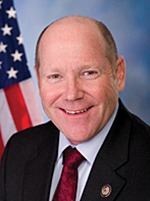January 2014 : Government Affairs
Words: Dan Kamys
Government Affairs
Bringing a slice of Wisconsin to our nation’s budget process.
 By Rep. Reid Ribble (R-WI)
By Rep. Reid Ribble (R-WI)
For too long, Washington has stumbled from budget crisis to budget crisis. Government shutdowns, short-term spending bills and an ad-hoc oversight process have corrupted our nation’s ability to budget effectively. Many of our problems stem from Congress consistently failing to pass an annual budget and its appropriations bills.
Every year, Congress is required by law to pass a budget. Every year, Congress is also required to pass 12 different spending bills to fund the government. Congress consistently fails to complete these requirements. Since 2001, Congress has managed to enact only 8.3 percent of those spending bills on time. It gets worse in election years.?? In the last eight election years, Congress has failed 75 percent of the time to even pass a budget. No boss in the world would accept this work performance from his or her employees, and it’s unacceptable that Congress can’t get its work done for the American people.
Recent studies have also shown that our budget process encourages agencies to develop a “use it or lose it” mentality. Agencies spend nearly 20 percent of their annual funds in the final five weeks of the year.?? Billions are spent unnecessarily, simply to avoid “losing” the money or giving it back to the treasury.?? Additionally, Congress wastes billions every year funding programs that are unnecessary and duplicative, because it simply doesn’t have enough time to properly review the government’s budget and spending activities. This is a clear failure to govern, and both parties are responsible. The American people deserve better than a broken system that creates unwanted economic uncertainty. It’s time for Washington to change its ways, and Wisconsin has the answer.
In order to foster greater economic certainty and create a better functioning, more efficient federal government, Congress should switch to a biennial budgeting system like one that’s used in Wisconsin. In May, I introduced the Biennial Budgeting and Enhanced Oversight Act of 2013. Congressmen Paul Ryan, Mark Pocan, and Sean Duffy were among the first to cosponsor the legislation. All of us sit on the House Budget Committee and see the problems within our federal budget firsthand. After dozens of conversations with members of Congress on both sides of the aisle over the last few months, I am happy to say that my legislation has more than 120 bipartisan cosponsors.
Wisconsin has relied on biennial budgets for decades. Historically, the Wisconsin legislature spends the first year focusing on budget and fiscal matters and uses the second year considering other types of legislation. Under Governors Thompson and Doyle in the past, and under Governor Walker today, this practice has worked for Wisconsin.
Our system here at home gives state legislators the ability to conduct oversight of state programs and gives state agencies time to make sure the programs effectively work toward the purposes they serve. It could work that way in Washington as well. Instead of forcing agencies to spend all of their time bureaucratically researching, planning and submitting budget plans for the upcoming fiscal year, biennial budgeting creates set times for departments to submit their budget plans, and dedicates the rest of the time to actually governing. And instead of encouraging agencies to use funds by year’s end, just so they don’t risk having a smaller budget the next year, agencies would have a longer time window to make effective, necessary spending decisions.
We cannot allow future generations to suffer because of our fiscal failures. In order to fix our broken process, Congress should take more time to research and discuss the problems in a responsible, fact-based manner.?? Switching to a biennial budgeting system will give Congress much-needed time to properly understand and research federal programs and agencies to ensure taxpayer funds are spent wisely. We in Wisconsin have been doing it for decades. It’s time Washington followed our lead.
This op-ed originally ran in the Green Bay Press-Gazette.
Return to Table of Contents